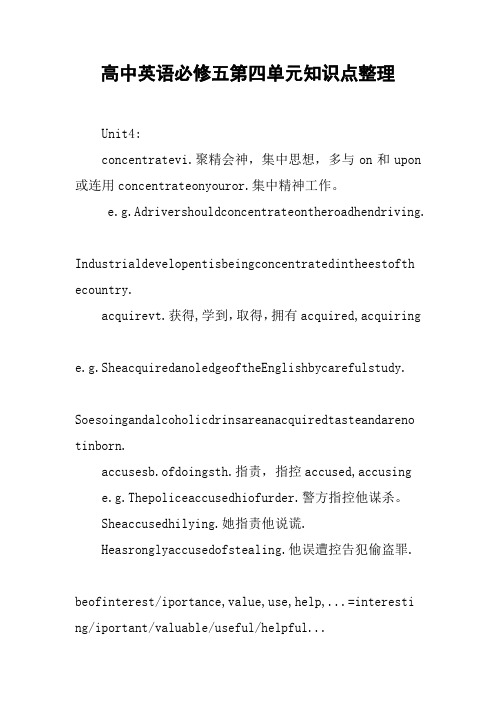高中英语必修五第四单元知识点整理
- 格式:pdf
- 大小:6.49 KB
- 文档页数:4


高中英语必修5第四单元重点、难点Unit Four Making the News1、Suppose you were to be a journalist for China Daily,…(p25) 假定你将成为中国日报的一名记者,…be to do…用法归纳:⑴表示按计划、安排的动作I am to do my job tomorrow. 我明天做工作。
⑵表示用来发出指示The door is not to be opened. 不能开门。
⑶用于征求对方意见What’s to be done next? 下来该做什么?⑷表示预料中要发生的事情My teacher had a talk with me. His words were to change my.我们老师和我谈了一次话,他的话会改变我一生的。
2、Now discuss in pairs how you would feel if you were offered a job on a famous newspaper.(p25)现在分组讨论如果一个有名的报纸给你了一份工作你是什么感觉。
offer v.用法归纳:(1)主动提出做某事My daughter offered to clean the room yesterday. 女儿昨天主动提出打扫房间。
特别提示:offer表示“主动提出做某事”时,后面一般跟动词不定式。
(2)主动给与They offered me a cup of tea when I arrived. 我到的时候他们给我了一杯茶。
(3)出价How much do you offer for my car? 我的车你给多少钱?特别提示:offer表示“出价”时,一般用“ offer some money for sth.”句型。
联想扩展:(1)“要价;索价”用“ charge some money for sth.” 句型。


高中英语必修五unit4重点单词1. therapist(n.):治疗师,特别是心理治疗师。
- The therapist helped her overcome her fear of flying.2. concept(n.):概念,观念。
- The concept of time varies in different cultures.3. devote(v.):致力于,献身于。
- She decided to devote herself to helping underprivileged children.4. syndrome(n.):综合症,综合征。
- Down syndrome is a genetic disorder.5. interact(v.):互动,交流。
- It is important for children to interact with their peers.6. consult(v.):咨询,寻求意见。
- I think you should consult a doctor about your health concerns.7. peer(n.):同龄人。
- He was always trying to fit in with his peers.8. therapy(n.):治疗,疗法。
- Music therapy has been shown to have positive effects on patients.9. diagnose(v.):诊断。
- The doctor diagnosed her with a mild case of pneumonia.10. interpret(v.):解释,理解。
- It can be difficult to interpret someone's true intentions.11. psychologist(n.):心理学家。

高中英语必修五第四单元知识点整理Unit4:concentratevi.聚精会神,集中思想,多与on和upon 或连用concentrateonyouror.集中精神工作。
e.g.Adrivershouldconcentrateontheroadhendriving.Industrialdevelopentisbeingconcentratedintheestofth ecountry.acquirevt.获得,学到,取得,拥有acquired,acquiring e.g.SheacquiredanoledgeoftheEnglishbycarefulstudy.Soesoingandalcoholicdrinsareanacquiredtasteandareno tinborn.accusesb.ofdoingsth.指责,指控accused,accusinge.g.Thepoliceaccusedhiofurder.警方指控他谋杀。
Sheaccusedhilying.她指责他说谎.Heasronglyaccusedofstealing.他误遭控告犯偷盗罪.beofinterest/iportance,value,use,help,...=interesting/iportant/valuable/useful/helpful...e.g.Thisisaatterofgreatiportance.这是一件非常重要的事。
Thebooisofgreatvaluetoe.这本书对我来说有很大价值。
Thereisnothinginteresting/ofinterestintoday'snespap er.journalistn.新闻记者;新闻工作者e.g.Heisaprofessionaljournalist.他是一位专门的新闻从业人员delighteda.高兴的,快乐的e.g.Iareallydelighted.我真的很高兴。

人教新课标高中英语必修5 Unit4重点知识点汇总Unit 4 Making the News核心词汇1. eager adj.热切的;渴望的【联想拓展】eager的用法表示渴望得到某物,后接介词for, after, about;表示渴望做某事,后接不定式;后接that从句时,从句谓语一般都用“should+动词原形”的虚拟语气结构。
We are all eager for/after/about knowledge.我们都求知心切。
He is eager for/after/about success.他渴望成功。
He is eager to go abroad.他渴望出国。
She is eager to see her parents.她渴望见到她的父母。
He’s eager that they (should) come to see him.他很希望他们来看他。
【易混辨析】eager/keen/anxiouseager 指“以巨大的热情渴望实现愿望或达到目标的”,有时也指“由于其他感情影响而表现急不可耐的”。
keen 指“对某人、某物怀有极大兴趣或热情的”。
anxious 指“热切地希望实现愿望,并因顾虑愿望落空而心情不安,感到焦虑的”。
2. meanwhile adv.此时;同时;其间n.同时(=meantime)meanwhile意为“同时,在此期间”,作为副词和名词,表示在某动作或情况发生或存在期间将可能发生另一件事。
它不用于说明人或事物的另一面。
【常用结构】in the meanwhile = in the meantime 在此期间They’ll be here soon. Meanwhile we’ll have some coffee.他们即刻就到,我们现在先喝点咖啡。
Meanwhile, my tongue was busy searching out the hole where the tooth had been.与此同时,我的舌头正忙于寻找被拔牙齿的伤口。
【拓展】 . 表示“使〔某人〕快乐,使〔某人〕欣喜〞。
n. 快乐,快乐,使人快乐的人或事。
. , 令人愉悦的常用短语:() . 喜爱,以......为乐’s 令人快乐的是快乐地如: . 他幽默的语言让观众们很快乐。
a . 杰克是个讨人喜欢的年轻人。
. 卡尔以取笑他的同学为乐。
使她所有粉丝快乐的是,她很容易地赢得了比赛。
, . 听见下课了,男孩们快乐地冲出来教室。
【随时练】, (芭蕾舞会).A. B. C. D.【答案与解析】A。
因为某事而快乐;表示人或事物的性质,意为“令人愉悦的〞;〔感到〕惊悸的;可怕的。
2、 . ,表示“集中〔注意力、思想等〕〞常与介词连用,也表示“使......集中于一点〞,常用于被动语态。
’ . (P26):A . 司机驾驶时应该专心于路况。
【拓展】 . 表示“集中的〞只能作定语;n. 表示“专心,聚集〞走神A. B. C. D.【答案与解析】B。
对......感到满足;对......感到骄傲;渴望;对......感到担忧。
4、 ., . . 表示“帮助;支援〞。
’ , ... (P26)常用短语:帮助某人做某事〔.〕 . 或. 我们都帮助修屋顶。
a .这个节目帮助年轻人容易找到工作。
【拓展】n. 表示“助手,助理〞;n. 表示“协助,援助〞,常用短语: . 帮助某人: . 从技术学校毕业后他成了厨师助理。
I ? 我可以帮助你吗?【随时练】A. B. C. D.【答案与解析】C。
. 帮助某人做某事;提供,常用 . ;供给,常用 . ;维持,养活。
5、 . . , 表示“获得,取得;学得〞。
. (P26)a() 得到……知识,精通: a .我们必须用功学习才能精通英语。
. 抽烟喝酒往往是一种后来习得的嗜好,并不是生来就有的。
【拓展】n. 获得;〔语言〕习得;获得物这位教师对儿童语言学习的理论感兴趣。
【随时练】A. B. C. D.【答案与解析】B。
句意:一些人返回学校想获取另一个文凭来增强社会地位。
必修五Unit41.occupation n. 职业,工作Please state your name, age and ~.用法:occupy v.Reading occupies (=takes up) most of my free time. 阅读占去了我空闲时间的大局部。
The bathroom is occupied. 浴室有人在用。
Occupy oneself( in doing sth/with sth)=be occupied (in doing sth/with sth.)=keep oneself busy (doing sth/with sth)忙着(做某事);忙(于某事物)He’s occupied in looking after/ with three small children.by occupation=by profession就职业来说He is a bus driver by occupation.他的职业是公车司机He is a lawyer by profession.〔profession职业-professional职业的-professor专家〕2.suppose表示“猜测;认为〞之意,相当于think或guess,常见用法有:●后接宾语从句。
如:John supposed that he could find some coins soon.I don't suppose she will agree with us,will she?●后接名词或代词+不定式〔不定式为to be时常可省略〕。
如:We all suppose him〔to be〕an expert in this field.●与believe,think,guess,expect等一样,后接so或not,后面省略了宾语局部。
如:—Will he come with us?他会跟我们来吗?—Yes,I suppose so.我想会的。
高中英语必修五第四单元知识点整理
课
件www.5yk
Unit4:
.concentratevi.聚精会神,集中思想,多与on和upon 或连用concentrateonyourwork.集中精神工作。
e.g.Adrivershouldconcentrateontheroadwhendriving.
Industrialdevelopmentisbeingconcentratedinthewestof thecountry.
2.
acquirevt.获得,学到,取得,拥有acquired,acquiring e.g.SheacquiredaknowledgeoftheEnglishbycarefulstudy.
Somesmokingandalcoholicdrinksareanacquiredtasteanda renotinborn.
3.
accusesb.ofdoingsth.指责,指控accused,accusing
e.g.Thepoliceaccusedhimofmurder.警方指控他谋杀。
Sheaccusedhimlying.她指责他说谎.
Hewaswronglyaccusedofstealing.他误遭控告犯偷盗罪.
4.beofinterest/importance,value,use,help,...=intere
sting/important/valuable/useful/helpful...
e.g.Thisisamatterofgreatimportance.这是一件非常重要的事。
Thebookisofgreatvaluetome.这本书对我来说有很大价值。
Thereisnothinginteresting/ofinterestintoday'snewspa
per.
5.journalist
n.新闻记者;新闻工作者
e.g.Heisaprofessionaljournalist.他是一位专门的新闻从业人员
6.delighted
a.高兴的,快乐的
e.g.Iamreallydelighted.我真的很高兴。
【词语联想】
delight
n.高兴,愉快;vt.使高兴,乐于;vi.感到高兴
e.g.Singingisherchiefdelight.
唱歌是她的主要爱好。
7.assist
n.帮助,协助;vt.帮助,促进;vi.协助,参加
【习惯用语】
øassistsb.withsth.帮助某人[做某事]
øassistsb.todosth.帮助某人[做某事]
øassistsb.indoingsth.帮助某人[做某事]
◆区别:help,aid,assist都含"帮助"、"援助"的意思。
øhelp系常用词,意义较aid,assist强,指"以积极态度给予各方面的帮助",强调"受助者得到帮助或好处",并着重"受助者对帮助的需要"
e.g.Please
helpmearrangethesepapers.
øaid属较正式用语,强调"帮助受助者脱离困难或危险",有时意味着"强者援助弱者"
e.g.Theyaidedfloodvictims.
øassist是正式用语,多指"在提供帮助时,帮助者起次要或起协助作用"
e.g.Sheassistedhiminhisexperiments.
课
件www.5yk 。